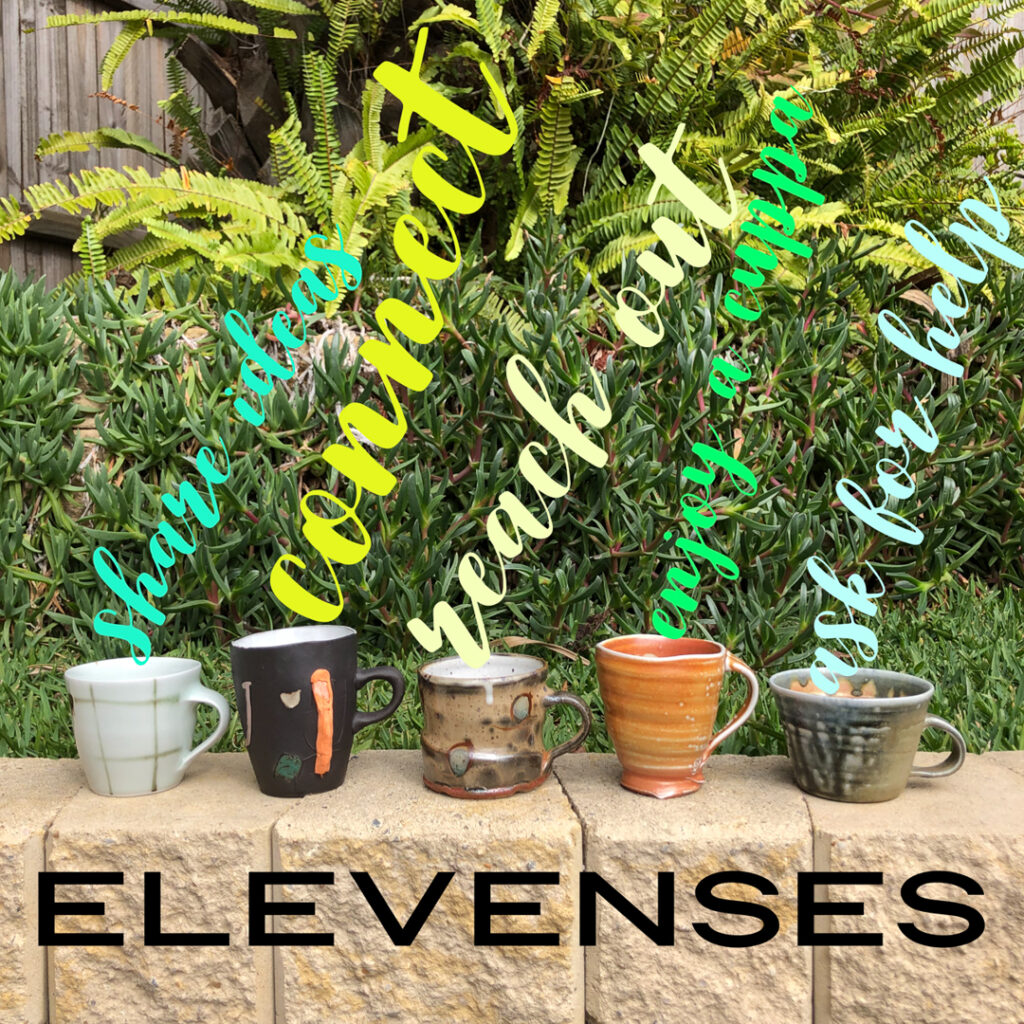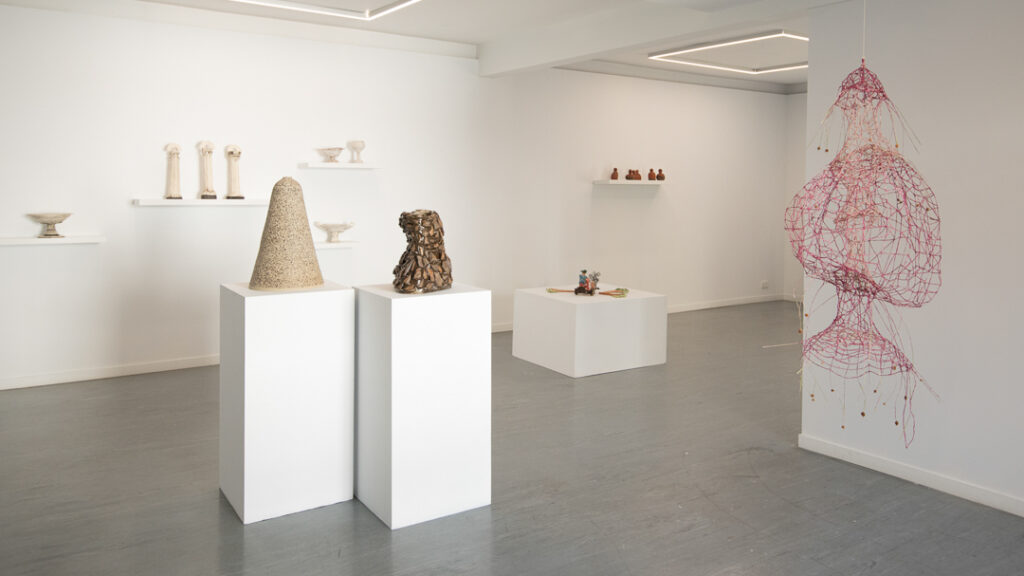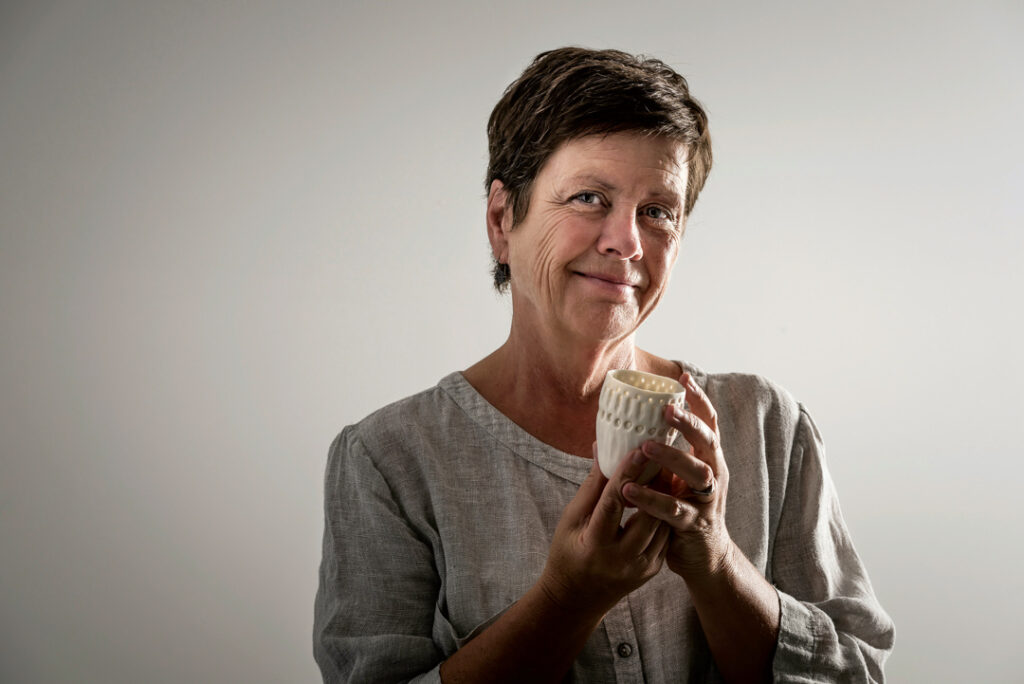
Selected Members of Clay Matters (opening of Facts of Matter), 23 February 2024, photo: Tina Wilkins Picture
Amelia Black writes about the way the Executive Officer of The Australian Ceramics Association created a sense of community in times of adversity.
For craftspeople, community and all it offers is an essential lifeline in their practice, and we are fortunate when individuals within our community step up to provide more of us a seat at the table, so that we might all feel like members bonded through a shared cultural association.
In the world of ceramics, many people’s first exposure is in community facilities where they learn alongside others. As they grow and evolve, they create studio spaces in garden sheds or old manufacturing spaces, and the distinct need for connection, resources, and opportunities becomes more acute. One organisation meeting that need for more than 60 years is The Australian Ceramics Association (TACA); one of the longest-running not-for-profits to exist without government funding. To its credit, TACA has continually published The Journal of Australian Ceramics (formerly Pottery in Australia) since May 1962, and until recently, Vicki Grima was at its helm. Commencing in 2006 as the Executive Officer of the organisation, Vicki was also The JAC’s Editor. She held both positions for seventeen years, 2006 to 2022.
Vicki Grima is a gregarious woman with a warm smile and a kind word who has been caring for the pottery community for a long time. Her leadership and vision have recently helped navigate the ceramics community through the challenging times of the pandemic by nurturing an environment where they could connect and consider ways to communicate their concerns and create solutions.
When the COVID-19 pandemic hit, TACA’s members faced unprecedented challenges. Workshops and community classes were cancelled, exhibitions were postponed, and members found themselves unable to access their studios. Recognising the urgent need to support its members, TACA offered free memberships to those facing severe financial difficulties. Vicki recalls, “From memory, we had not held online Zooms up to that point, so I just jumped in.” This swift pivot to online platforms allowed TACA to maintain vital connections within its national membership base.
The decision to use open Zoom meetings instead of webinars was strategic. Open meetings enabled everyone to see and speak with one another, creating a more personal and engaging environment. “We liked the open Zoom meetings as everyone online could see everyone else in the meeting,” Vicki explains. This sense of visibility and community was crucial during a time of isolation and uncertainty.
- Screenshot Elevenses, The Australian Ceramics Association
- Elevenses Invitation Graphic, The Australian Ceramics Association
The inspiration for TACA’s online Zoom sessions came from a desire to check in with members and provide a space for them to connect. The ELEVENSES series, a month-long program of weekly meetings, was designed to address different aspects of mental health and provide support during lockdowns. Guest presenters brought diverse perspectives, and the sessions covered topics ranging from daily rituals to adapting ceramics practices.
Feedback from these sessions was overwhelmingly positive. Participants appreciated the opportunity to share their experiences and felt a sense of continuity and support. Vicki notes, “People remember these sessions and still mention them to me as heartwarming connections made during Covid.” The success of ELEVENSES led to the development of subsequent programs like the TOOLS FOR PRACTICE series, which continued to support the ceramics community.
The idea for the Clay Matters group also emerged organically during the ELEVENSES sessions. Vicki and other members realised they had a common desire to address environmental issues within their practice. They began meeting regularly on Zoom with one of the first outcomes being the development of the Potters Pledge: a set of guidelines aimed at promoting sustainable practices in ceramics.
The collaborative nature of Clay Matters has been key to its success. Members worked together to define their goals and create a supportive community. The Potters Pledge provides clear guidelines for ceramics practitioners, encouraging them to lead and inspire climate action. “We wanted to be positive and encouraging, not negative and depressing,” Vicki emphasises.
Clay Matters has also helped individual artists share their concerns about the environment through exhibiting their work. The collective’s first exhibition, Clay Matters 1, held at Slow Clay in December 2022, and the subsequent exhibition, Facts of Matter, held at the Linden Art Centre in February 2024, brought members together and showcased their commitment to sustainability. Additionally, initiatives like Materials Provenance have aligned with the collective’s values: sharing knowledge, promoting responsible sourcing and use of materials.
Being part of an arts collective like Clay Matters offers numerous benefits. It provides a platform for members to share their skills, learn from each other, and work towards common goals. Vicki highlights, “I am challenged to consider my own ceramics practice, and I also like working collectively. Each person brings their strengths to the ‘table’ and I have enjoyed the variety of actions we have taken.”
The collective impact of Clay Matters extends beyond individual practices. The group has successfully lobbied for political action on climate change and continues to inspire the broader ceramics community. These shared values and sense of purpose have created a resilient and dynamic collective.
While the pandemic underscored the importance of arts communities for artists and the need for connection and support, it also highlighted how fortunate we are for leaders like Vicki Grima. Whether in the form of a more formal organisation like TACA, or the more informal membership of Clay Matters, she has expanded the table, making room for new voices and fostering a culture of support and collaboration. Her vision and dedication have not only sustained the ceramics community through challenging times but have also empowered it to grow stronger and more united, ensuring that the art of ceramics continues to thrive on the unceded lands of Australia.
- Vicki Grima, photo: Greg Piper
- Vicki GRIMA, Rock Bottle with stopper (series), 2024, Red Earth midfire clay, oxide, glaze, dimensions vary, Photo -Tina Wilkins Picture
About Amelia Black
 Amelia Black is an American-born ceramic artist and material researcher living and working in Naarm/Melbourne. They are active members of Clay Matters and the Alternative Ceramic Supply collectives and their work explores where our materials come from and how we might engage with the technology of craft to create more sustainable solutions.
Amelia Black is an American-born ceramic artist and material researcher living and working in Naarm/Melbourne. They are active members of Clay Matters and the Alternative Ceramic Supply collectives and their work explores where our materials come from and how we might engage with the technology of craft to create more sustainable solutions.






